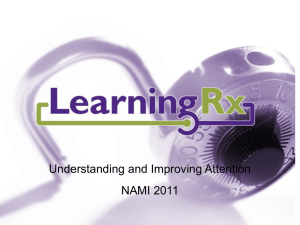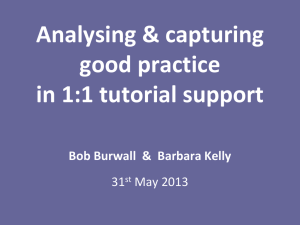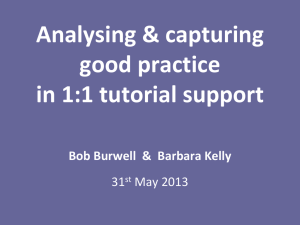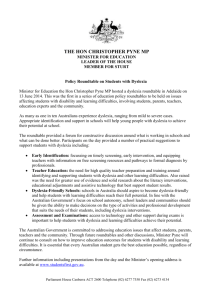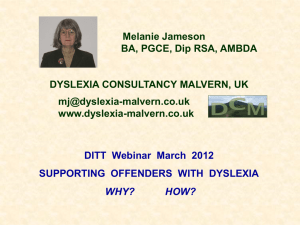Dyslexia_flyer
advertisement
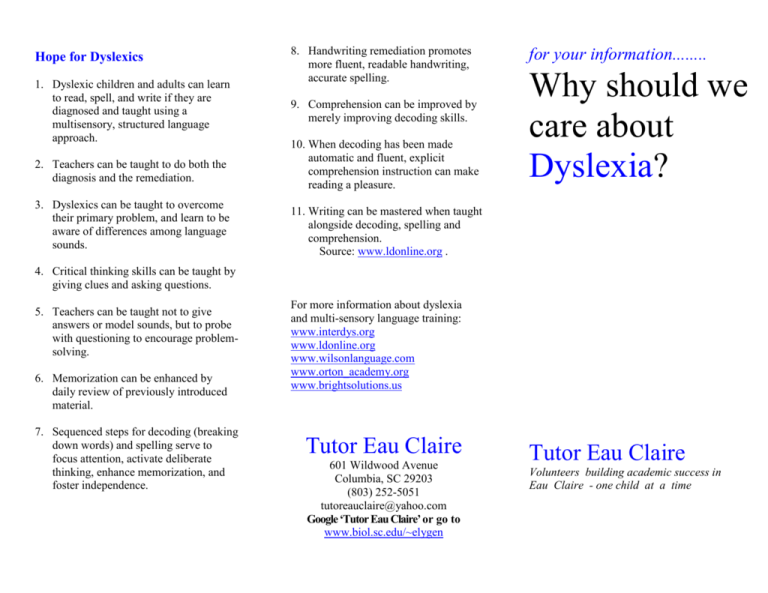
Hope for Dyslexics 1. Dyslexic children and adults can learn to read, spell, and write if they are diagnosed and taught using a multisensory, structured language approach. 2. Teachers can be taught to do both the diagnosis and the remediation. 3. Dyslexics can be taught to overcome their primary problem, and learn to be aware of differences among language sounds. 8. Handwriting remediation promotes more fluent, readable handwriting, accurate spelling. 9. Comprehension can be improved by merely improving decoding skills. 10. When decoding has been made automatic and fluent, explicit comprehension instruction can make reading a pleasure. for your information........ Why should we care about Dyslexia? 11. Writing can be mastered when taught alongside decoding, spelling and comprehension. Source: www.ldonline.org . 4. Critical thinking skills can be taught by giving clues and asking questions. 5. Teachers can be taught not to give answers or model sounds, but to probe with questioning to encourage problemsolving. 6. Memorization can be enhanced by daily review of previously introduced material. 7. Sequenced steps for decoding (breaking down words) and spelling serve to focus attention, activate deliberate thinking, enhance memorization, and foster independence. For more information about dyslexia and multi-sensory language training: www.interdys.org www.ldonline.org www.wilsonlanguage.com www.orton_academy.org www.brightsolutions.us Tutor Eau Claire 601 Wildwood Avenue Columbia, SC 29203 (803) 252-5051 tutoreauclaire@yahoo.com Google ‘Tutor Eau Claire’ or go to www.biol.sc.edu/~elygen Tutor Eau Claire Volunteers building academic success in Eau Claire - one child at a time Dyslexia affects us all…….. Dyslexia affects 1 in 5 children. Students with learning difficulties can be recognized as early as kindergarten. Of children evidencing reading problems in first grade, 74% will be poor readers in 9th grade, without intervention. 85% of students in special ed classes are dyslexic. 60% of adolescents in treatment for drug and alcohol problems have a learning disability 35% of dyslexics drop out of school. 60% of adults with severe literacy problems have a learning disability. 90% of the incarcerated are functionally illiterate. Source: Dr. Desmond Kelly, Director of Donald A. Gardner Family Center for Developing Minds, Greenville, SC, Keynote speaker at the 2006 SC International Dyslexia Association Conference in Greenville, SC. Characteristics of Dyslexia reading difficulties oral language difficulties writing difficulties mathematics difficulties Dyslexia is a learning disability resulting from a difference in the way a person’s brain is wired. Children with dyslexia are as smart or smarter than their peers, but they may have difficulty reading writing, spelling, reasoning, recalling and/or organizing information if left to figure things out for themselves or taught in conventional ways. It is a life-long condition that cannot be cured or fixed. However, children with dyslexia can succeed in school by encouraging their strengths, knowing their weaknesses, understanding the educational system, working with professionals and learning about strategies for dealing with specific language difficulties. “Dyslexic students need a different approach to learning language from that employed in most classrooms. They need to be taught slowly and thoroughly, the basic elements of their language - the sounds and the letters which represent them-and how to put these together and take them apart. They have to have lots of practice in having their writing hands, eyes, ears, and voices working together for the conscious organization and retention of their learning.” -Margaret Rawson Founding Member, International Dyslexia Association Tutor Eau Claire is making a difference…. Tutor Eau Claire offers Dyslexia Information Seminars for parents and teachers. Tutor Eau Claire provides training and tutoring opportunities for volunteers. Tutor Eau Claire offers after-school tutorials and one-on-one tutoring. Tutor Eau Claire offers a Family Fluency Program for involved parents. Tutor Eau Claire has helped many students learn to read and meet grade level standards. For more information, contact Tracey Ely at Tutoreaucalaire@yahoo.com. Mrs. Ely is on the Board of the SC Branch of the International Dyslexia Association, a certified Wilson Reading System instructor (Level 1), Associate of the Academy of Orton-Gillingham Practitioners and Educators, and recipient of the President’s Call to Service Award for her community education efforts.



